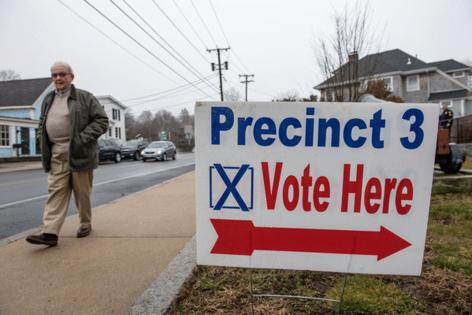Election transparency group eyeing voter ID, mail-in voting ballot questions for 2026
Published in News & Features
BOSTON — A group focused on transparency and accountability in elections plans to pursue two ballot questions in 2026 that would require voter identification at the polls and strip away Massachusetts residents’ ability to participate in no-excuse mail-in voting.
The effort marks the second time in as many election cycles that an organization is attempting to push a question that would require identification to cast a ballot. A group led by conservative activists did not gather enough signatures to advance a measure during the 2024 election.
But Jeff Cohen, the co-director of MA 4 Fair Elections, said advocates this year are more organized and learned important lessons during the last election.
“We have a lot of volunteers already lined up,” he told the Herald. “We’re going to create training videos, and we’re going to have a tracking mechanism, communication mechanism. We barely even had a website the last time we did this. So I think we’re in a good position now. We’re confident that we’re going to get these questions passed.”
Cohen billed his group as a nonpartisan entity trying to make sure that elections in the state are conducted lawfully.
But Cohen, who has donated to Republican candidates in past years, spent a few minutes Thursday night asking members of the Massachusetts Republican Party for backing during their monthly state committee meeting.
“Although our group is nonpartisan, I believe that these questions, if they get on the ballot, are going to drive your voters to the polls,” he said during the meeting. “So it’s in your best interest to get involved with this process and, towards that end, I would encourage you to get in touch with the (Republican Town Committees).”
He also said that the “support from the GOP has to be very carefully crafted.”
“We can’t be partnering with any particular party,” he said at the meeting. “The word that needs to be used is support, and it’s very critical that we use that word as opposed to something else. We need those unenrolled voters in order for us to get this over the finish line.”
In a phone call with the Herald Friday morning, Cohen said he has reached out to Democratic Town Committees to help collect signatures for the ballot questions.
“Essentially, they dismissed me, at least last year anyway,” he said. “In general, I don’t know whether it’s the media or who’s responsible, but in my opinion, the election integrity arena has been sort of labeled as a partisan issue. It’s not a partisan issue. We should all be concerned about free and fair elections.”
The group tried to advance different versions of a ballot question ahead of the 2024 election that sought to require prospective voters to show his or her photo identification before being given a ballot at a polling place on Election Day.
The photo ID would have needed to come from a branch of the United States Government, a state, or a tribal authority.
Cohen said the organization plans to file a final version of the ballot question they hope to advance to the 2026 election by Aug. 6, or the date prospective proposals are due to the Attorney General’s Office for review.
“The final language on these petitions will not be released, per our attorney’s guidance, until they’ve been approved by the attorney general, and we expect to get approval from those, hopefully around Sept. 3,” Cohen said at the MassGOP meeting.
Voters in Massachusetts may already need to show identification when they check in at their polling place.
That includes if they are voting for the first time in the state, are on the inactive voter list, are casting a provisional or challenged ballot, or the “poll worker has a practical and legal reason to ask for identification,” according to Secretary of State William Galvin’s Office.
Acceptable forms of identification must show the voter’s name and the address where they are registered to vote and can include a driver’s license, state ID card, recent utility bill, rent or lease document, a copy of a voter registration affidavit, a letter from a school or housing office, or “any other printed identification” that includes a name and address, Galvin’s office said.
But Cohen argued that “anybody can go in and vote in someone’s stead.”
“They ask you your name and address. That’s it. They don’t know, necessarily, who you are when you go to vote,” Cohen told the Herald Thursday night after addressing the MassGOP. “Voter ID is going to positively identify the person that has voted.”
Other election advocacy groups have said implementing voter identification can make it harder for some groups to cast ballots.
“Polling place closures, limits to vote-by-mail, and needlessly strict voter ID regulations can prevent eligible voters from casting their ballot—and lately, this playbook of voter suppression strategies has become more popular,” Common Cause Massachusetts says on its website.
-------------
©2025 MediaNews Group, Inc. Visit at bostonherald.com. Distributed by Tribune Content Agency, LLC.







Comments